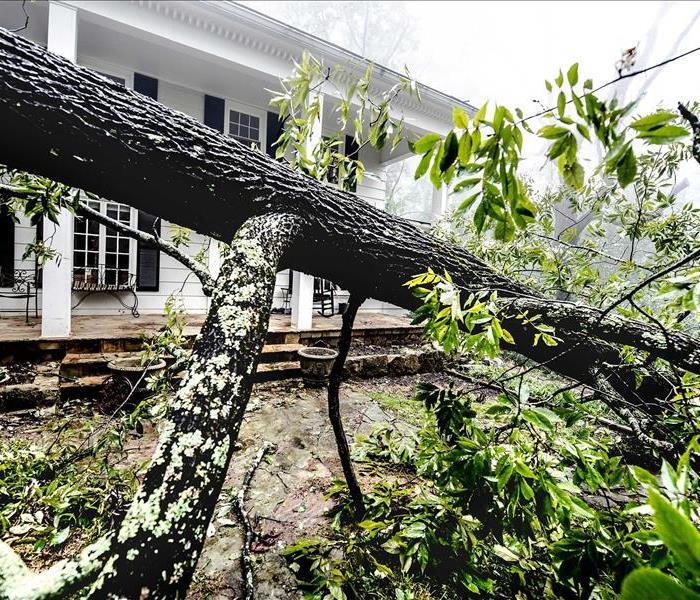SERVPRO of Metairie explains the various processes of a hurricane cleanup.
6/17/2022 (Permalink)
Blog Summary: Are you looking to clean up your home after a hurricane? SERVPRO of Metairie outlines how you can go about it.
The cleanup of a natural disaster like a hurricane is an emotional and time-consuming process, and it can also cause other effects to health and safety. Hurricane cleanup necessitates the use of specialized supplies, procedures, and products. Jefferson, LA homeowners, and businesses can find it challenging to know where to begin amid the destruction and debris.
SERVPRO of Metairie has been on the front lines of various hurricane cleanups. They’ve seen homes flooded, buildings wrecked, and many types of destruction over the years. They share these tips to guide property owners on how to go about a hurricane cleanup.
1. Wait for daylight
While it might be tempting to get right to cleaning your home after a hurricane, the CDC suggests waiting until dawn to return to your home, especially if the power is out. This will aid you in seeing and avoiding any dangers.
2. Take Pictures
Most home insurance policies often cover Hurricane disasters. So you’ll need to file a claim with your insurance provider later on. To help with this, make sure to take pictures of the damage with your phone as proof to file your claim. Consider doing this before you start the cleanup process.
3. Wear the appropriate protective gear
Disasters generate a wide range of debris, so plan accordingly. Wear old clothes and gloves to protect yourself from the mess, regardless of what you're cleaning up. Take precautionary measures when handling potentially dangerous items like propane tanks, electrical equipment, or sewage.
Wear protective equipment such as gloves, boots, and face masks. Always follow the manufacturer's directions when using a chainsaw to clear fallen trees or branches, and wear protective clothes, earplugs, and safety goggles.
4. Conduct a thorough walk-around examination
Inspect your home and yard with a partner to ascertain the level of damage. As mentioned earlier, take pictures of everything. Also, avoid any standing water since it may contain submerged debris or be electrically charged from underground or dead power lines. If you notice this, contact the utility company.
Look for damage to the roof, siding, windows, and doors. Flashing, gutters and missing shingles will need to be replaced. Typically, you’ll have minor damage if you secure your windows and doors before the storm.
5. Make a disposal strategy
There is no way to anticipate the consequences of a natural disaster fully. However, planning beforehand might help relieve some of the stress of hurricane cleanup. Make a list of people you should contact to get rid of particular objects. Most municipal governments provide free debris collection as long as your rubbish is adequately sorted and placed on the curb.
6. Look for any gas leaks
Do not turn on lights, light matches, or do anything else that could generate a spark if you smell gas or suspect a leak. Leave your residence right away and move a good distance before calling the utility provider on your telephone. The phone may spark, igniting the natural gas and causing an accident.
7. Stay away from wet appliances
If your electrical or gas appliances have become wet, don't use them, and don't use broken equipment, there's a risk of electric shock or fire. If you don't unplug your washing machine and the laundry room floods to the point that the water covers the electrical outlets, the standing water could be electrically charged and deadly. Even if your appliances were not flooded, water could have caused harm to their motors.
8. Examine your HVAC system for any signs of flooding
Water could have gotten into your furnace, water heater, or air conditioner, causing corrosion. They could create a breeding ground for mold, bacteria, and other growth, posing potential health issues. Because they deal with air quality, these products should be properly inspected and cleaned, if not replaced. Contact a qualified service provider to determine whether your system can be fixed or needs to be replaced.
9. Get Professional Help
If your home has been flooded, you can be assured that there is some water damage. Examine your siding for signs of water seepage into your insulation. The water can also cause mold and decay if not properly handled. A professional water restoration company like SERVPRO of Metairie helps you carry out hurricane clean-up properly. They have a team of highly trained professionals experienced in hurricane cleanups and content restoration.
They will come to your Jefferson home or business and work with you to restore it to its pre-hurricane state. The SERVPRO of Metairie will remove water from your home, clean, dry, disinfect, and deodorize it. They will also tackle mold growth and restore your belongings to their previous state.
Need help? Call SERVPRO of Metairie today at (504) 496-0193 to speak to their restoration professional.



 24/7 Emergency Service
24/7 Emergency Service